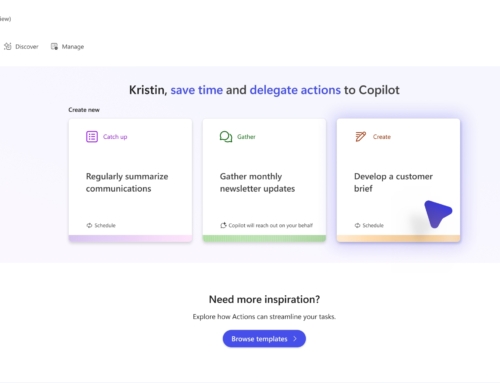As the Power Platform evolves and becomes a Low-Code Application Platform (LCAP) of choice for enterprise organizations (a leader in Gartner 2023 Magic Quadrant for LCAPs), the need to consider a more robust data source than SharePoint Lists for your Power Apps becomes critical. There are a couple of options to consider including Dataverse for Teams, Dataverse, Azure SQL, and SQL Server. This post will focus on two common data source options, SharePoint Lists and Dataverse (not Dataverse for Teams), and the considerations for using one over the other in your Power App.
Let’s start with the basics:
SharePoint Lists
A SharePoint List is a collection of data that you can share with others. A Power App can be created to interact with the data in a SharePoint List. SharePoint Lists have been around for many years and often, organizations already have their data stored in Lists. SharePoint Lists are part of your SharePoint/M365 subscription and do not require additional licensing.
Dataverse
Dataverse (formerly Common Data Service – CDS) is a relational database like SQL Server that allows you to securely store and manage data in the cloud. Dataverse provides robust options for complex enterprise requirements and comes with an additional licensing cost.
Important questions when choosing between SharePoint Lists and Dataverse
If licensing is not a consideration, we’d likely recommend Dataverse for all but the simplest personal productivity applications. To determine which option, SharePoint Lists or Dataverse, is best for you, you’ll want to ask the following questions:
Data:
- What types of data (and how much of it) will your Power App require?
- How do you want to search the data?
Application:
- How will the app be made available to your users?
- Will guests be accessing the app?
- Who will build the app – low-code or pro-code developers?
- What special capabilities does your application need?
Integration:
- Are any integrations required?
Admin and Governance:
- What are your organization’s security and compliance requirements?
- Are there special requirements for backing up and restoring data?
Licensing:
- Is premium licensing available or can it be purchased?
From there, you’ll want to have a Power Apps Architect review the answers to these questions along with the following considerations between SharePoint Lists and Dataverse, adapted with our comments from the Microsoft Learn Site.
Considerations between SharePoint Lists and Dataverse
Considerations |
SharePoint Lists |
Dataverse |
| Types of data | Lists, File, Image | Relational, File, Image, Lake, Log, Dataverse Search Virtual tables |
| Number of data types | 15 | 24 (Currency is advanced version) |
| Common Data Model | N/A | Full support |
| Capacity | Up to 30M rows (considerations for lists > 100k) |
No specified limit on rows.
No specified limit of files or images. For limits on API requests per day, with the option of capacity add-ons, go to this article: Request limits based on user licenses |
| Data movement | Create from/Export to Excel | Dataflows In/Out Server-side sync Synapse Integration (Bring Your Own Data Lake, Data Factory) |
| Security | Owners, Members, Visitors, Designers, Approvers roles Customizable permissions
Cumbersome row-level security (limited to 50k rows) No column security |
Robust options to satisfy complex enterprise scenario requirements, such as roles, business units, auditing, CMK, hierarchical/field-Level security, and so on
Row and Column security |
| Clients | Lists, Teams, custom code | Teams, Power Apps, Power Pages, Dynamics 365, custom code |
| Guest limitations | Can’t create or delete a list | Must be in Azure AD using Azure B2B |
| Power BI | Batch load of data only | Batch load or Live Query |
| Pro developer capability | REST API Graph API |
REST API Software Development Kit (SDK) Plug-in Support Integration (Event Hub, Service Bus, Webhook, Export to Lake) SQL Server Management Studio Integration |
| Package and deploy | Package and deploy Lists | Unlimited |
| Additional capabilities | Calculations and rollups | Business workflows Business rules Calculations and rollups Mobile offlineHigher aggregation limitationHigher data query performanceSupports Text search |
Licensing considerations
While the capabilities of Dataverse are full-featured and preferred for enterprise-grade Power Apps, the licensing implications have been a key consideration for our customers. Depending on the size of the organization and who is commissioning the Power App, the business and IT stakeholders may be far removed from the Microsoft 365 Platform Owner and unclear as to how to request licensing, especially if early on in the Power Platform journey.
Get expert help with the Power Platform
If you are new to the low-code/pro-code approach using the Power Platform and would like to work with a qualified partner, reach out at any time to discuss Compass365’s Power Platform Consulting Services We are happy to help. Please contact us to arrange for a complimentary consultation.
Compass365, a Microsoft Gold Partner, delivers SharePoint, Microsoft Teams, and Power Platform solutions that help IT and Business leaders improve the way their organizations operate and how their employees work.
Subscribe
Join over 5,000 business and IT professionals who receive our monthly newsletter with the latest Microsoft 365 tips, news, and updates.









